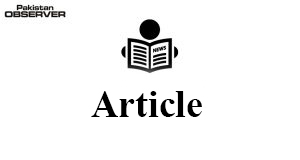Kanwar Muhammad Javed Iqbal
Ship Recycling is an important and labour intensive but quite challenging informal segment of Pakistan’s maritime economy which has many governance issues in federal and provincial context. Status of this economic activity is not clear and it has faced many ups and downs during different governance regimes in the past. Now, it is in a continuous downward trend since the beginning of FY 2018-19.
Steel from ships acts as market price stabilizer by meeting approximately one third of all local steel requirements thus protecting the consumer interests. It also helps in poverty alleviation by providing direct employment to more than 20000 workers at Gadani along-with a big indirect pool of workers in its value chain, and supports to their families of nearly one million household population. Additionally, it contributes substantial tax payments to Federal and Provincial Governments. As per record of Pakistan Ship breakers Association (PSBA), more than PKR 16 Billions were tax paymentsfrom1.67 million metric tons of ship steel reported for FY 2017-18, a significant contribution towards national tax collection. Unfortunately, during the subsequent FY 2018-19, this tax amount has shrunk down to approximately one fourth i.e. PKR 4.8Billion and the ship recycling tonnage has declined to one fifth (0.37 million metric tons).
There is a need to understand, why FY 2018-19 has shown descending trends in overall production and abnormal ratio between ship recycling tonnage delivered at Gadani and the tax payment? Firstly, the buying of end of life ships was affected due to devaluation of PKR and rising exchange rate thus Pakistanis could not compete with more competitive bidding from Bangladeshi and Indian investors. Secondly, the new taxation rules of present government have affected the overall value chain. Thirdly, due to higher price of scrap ships in international market, there is now more competition between prices of ships re-rollable scrap and the other imported re-rollable steel. The government has imposed heavy taxation on second hand ships, however, the rate of taxation on imported re-rollable scrap is less, while both act as a raw material.
Under Sales Tax Special Procedure Rules 2007, there was a fixed sales tax rate i.e. PKR 9500/MTfor the ship breakers. This rate was applicable on a recoverable percentage of total ship steel i.e. 72.5% and 80% out of total LDT (Light Displacement Tonnage) of dry cargo vessel and tankers respectively. However, this flat rate is no longer continued under the Finance Bill 2019 and 17% sales tax has to be paid at import stage for a total LDT of a second hand ship. According to FBR Sales Tax SRO 697(l)/2019 dated 29 June 2019, the values of produced goods are specified on ad-valorem basis which include ship plates value PKR 72000/MT and other imported re-rollable iron & steel scrap value of PKR 47000/MT. It shows an unfair advantage of imported re-rollable steel over the ship steel which has increased difficulties for the ship breakers to generate a required local market demand of ship plates in the presence of more incentive to imported re-rollable scrap thus limiting them to contribute a rightful market share.
It is pertinent that the current government’s fiscal policies have caused reduced operations at Gadani resultantly tax payment during FY 2018-19 also dropped down to approximately 22% from the level of FY 2017-18, which is an alarming situation for the tax collection target. It is feared that the ship breaking activities may come to a standstill unless the government provides a level playing field to the economic operators by revisiting and rationalizing the taxation regime for the overall value chain involved.
In addition, clean and safe operations always remained a question mark for Gadani Ship breaking Yard. Now, the Economic Operators are trying to comply with national legislation and international obligations of Hong Kong Convention, Basel Convention and EU regulation by achieving certifications of ISO-14001, ISO 9001, ISO 18001 and ISO 30000. Pakistan has ratified the Basel Convention; however, a compliance instrument is yet to be established. The Government of Pakistan should ratify the Hong Kong Convention and seek its early compliance. Moreover, the government should ratify ILO Convention No. 187 which is related to the promotion of occupational safety and health.
Despite various efforts, so far ship breaking is not recognized as an industry and it has no parent ministry. For infrastructure development regarding clean and safe operations, there can be public private partnerships (PPP) but it is a big question mark in the absence of parent ministry as a government department is required to materialize PPP under PPP Authority Act 2017.The Federal Government needs to declare this informal sector as an “Industry” for Ship Recycling which can either be placed under Ministry of Maritime Affairs (MoMA) or Ministry of Industries. In addition, an incentive based National Ship Recycling Policy, a Regulation and a “Green Ship Recycling Strategy” should also be formulated by taking guidance from the Chinese Green Ship Recycling General Regulation (WB/T-1022-2005), to allow for the needed transition towards clean and safe ship recycling.
— Lead Researcher at National Institute of Maritime Affairs, reachable at [email protected]










